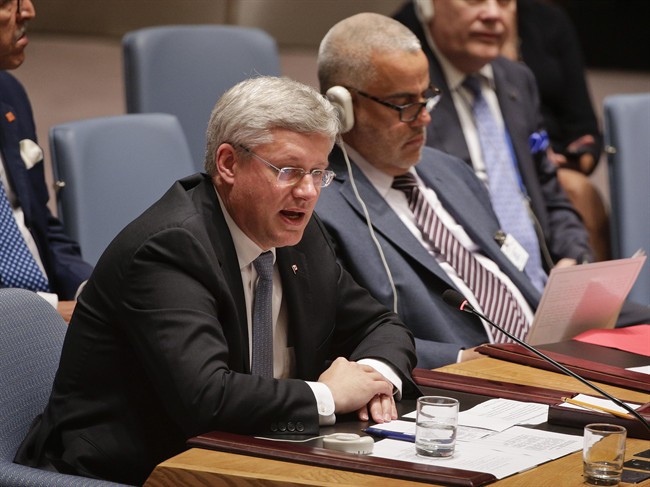UNITED NATIONS – Canada will contribute to a new international fund to prevent maternal and newborn deaths, part of what Prime Minister Stephen Harper calls his No. 1 foreign-development priority.

Harper and the representatives of several other national governments announced Thursday their plans to help set up a US$4-billion fund to be run by the World Bank.
The Global Financing Facility will aim to build a pool of private-sector money as well, to help reduce mortality rates and to create better data-gathering systems.
READ MORE: Harper to address UN General Assembly, 1st time since 2010
Harper made the announcement at the United Nations, pledging $200 million in Canadian money, which will flow from the $3.5 billion he promised earlier this year at a summit held in Canada.
Maternal and newborn deaths have plummeted over the last two decades, but not enough to meet the UN’s Millennium Development goals. Harper said he’s glad the cause has momentum on its side.
“I’m pleased to see that not only do these meetings keep growing in size, but so do commitments,” Harper said, referring to progress since he put the issue on the agenda of a G8 meeting in Muskoka in 2010.
He then turned to the World Bank president seated next to him, Jim Yong Kim, and made a tongue-in-cheek reference to the plan to leverage private money: “I want to congratulate Jim and the World Bank,” Harper said, “for using the financial expertise of Wall Street for good.”
WATCH: Prime Minister Stephen Harper addresses UN Security Council
The head of UNICEF Canada said the government’s work on that file is being noticed among his colleagues elsewhere in the world.
David Morley said the solutions to maternal and newborn deaths are relatively simple — they just require money and political will.
He cited three areas in particular: more trained nurses in outlying communities; better access to telecommunicatons technology, like text messaging; and cooling equipment to keep vaccines cold during transportation.
The UN Millennium Development Goals set out a target of reducing the under-five mortality rate by two-thirds between 1990 and 2015.
That target won’t be achieved, as was emphasized in a new UNICEF report.
EXCLUSIVE: U.S. says Canada offered to help in Iraq – not the other way around
But that report also concluded that the number of deaths has declined by half — not only in absolute terms, but also per capita — dropping from 90 to 46 deaths per 1,000 live births in 2013.
“These are impressive numbers in a conference room in New York. They are even more meaningful in hospitals,” said UN Secretary General Ban Ki-moon, who appeared at the event before Harper and colleagues from Norway and the U.S. spoke.
“In today’s troubled world, our progress in this area shines brightly. It demonstrates what we can achieve when we come together.”
Morley called it a “child-survival revolution.” Someone ese who works with the Canadian government on the file saluted the commitment.
“(Harper) could have chosen so many other issues at the time he hosted the G8,” said Rosemary McCarney, a spokeswoman for the Canadian Network For Maternal, Newborn and Child Health.
“He could have chosen a trade issue, or a fiscal policy issue, but he chose this issue.”



Comments